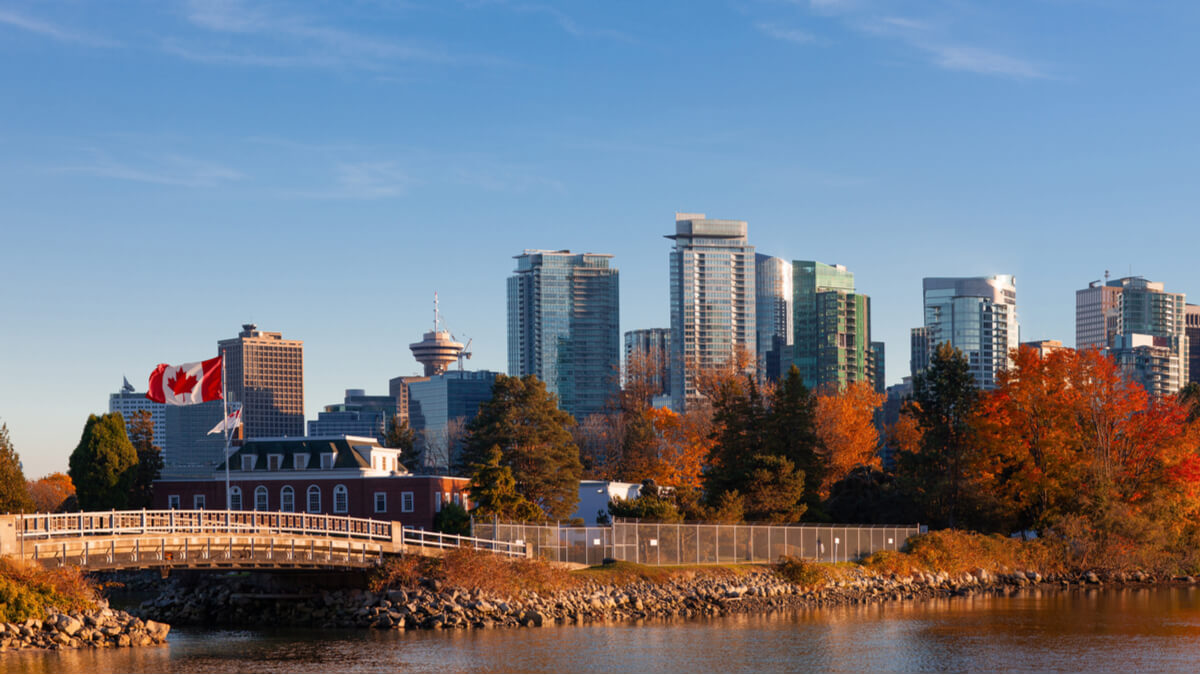Canada Digital Nomad Visa Guide for Filipinos: Requirements, how to apply, and what to expect
Want to work abroad? Find out about the Digital Nomad visa Canada, requirements, and how to get a Canada digital nomad visa for Filipinos.

With gorgeous scenery, a stable economy, and friendly locals, Canada remains one of the top working destinations for Filipinos. The country has plenty of opportunities across different sectors, and the fair labour laws and competitive salaries make it an excellent destination to improve your CV or pursue a new career path.
In addition, the large Filipino community can make settling in easier, and many immigration pathways can also lead to long-term residency. In this blog post, we’ll share all you need to know about starting a new life in Canada, and the various job opportunities that are popular with Filipinos. We'll also introduce the Wise account, a handy companion to make your money go further with low, transparent fees.
As of 2025, there are almost one million Filipinos who live and work in Canada, making it one of the fastest-growing ethnic groups. The majority of Filipinos are spread across various provinces like Ontario, Alberta, and BC, but significant communities are also in Manitoba and Saskatchewan.¹
The population of Canada is approximately 41 million, making the Filipino community a substantial part of the workforce, contributing to the economy as healthcare, IT, and executive professionals.
If you’re thinking of making the big move to work in Canada, first, you’ll need the right visa. Filipinos are eligible for many different visas, and here are the most popular ones.
The most popular way for young Filipinos aged 18 to 35 to work in Canada is the IEC program, which allows you to stay for up to 12 months. This flexible pathway is ideal for temporary employment to fund your travels and gain international working experience without a specific job offer from a Canadian employer.
You’ll need a valid passport, proof of sufficient funds, and health insurance coverage. The downside is that this program runs on a lottery system and spots are allocated through IEC draws.²
There are two main types of work permits. The employer-specific work permit allows you to work in Canada if you receive a job offer from a Canadian-registered company. To qualify for this, you’ll need a copy of your employment contract and a copy of a labour market impact assessment (LMIA), which demonstrates the need for a foreign worker.
For LMIA-exempt workers, you’ll need an offer of employment number that your employer can get from the Government of Canada Employment Portal.³ The exception falls under the International Mobility Program (IMP), where certain foreign workers can obtain a work permit without requiring the LMIA.
Another kind of work permit is the Open Work Permit, allowing you to work for any employer in Canada unless the company is listed as ineligible. You can only get an open work permit in specific situations, and most jobs will also require a medical exam.
Atlantic Immigration Program (AIP) - Designed to attract foreign talent keen on working in Canada’s East Coast, the AIP is valid for two years and then renewable. The eligible provinces are Nova Scotia, New Brunswick, Prince Edward Island, and Newfoundland & Labrador.
Rural and Northern Immigration Pilot (RNIP) - Focuses on attracting immigrants to smaller communities.
Agri-Food Immigration Pilot - Targets workers for the Canadian agri-food sector.
In addition to a valid working visa, Filipinos looking for work in Canada also have a few other requirements. You’ll need a passport that’s valid for more than six months, and a job offer if you are applying for the employer-specific work permit.
Many positions will also require you to prove English or French language proficiency through recognized tests like the IELTS. In addition, you’ll need a relevant medical check and police clearance certificates, an updated CV, and copies of all your education qualifications or vocational training, depending on the type of visa you’re applying for.
Legislation changes, so be sure to visit the Government of Canada immigration site for the latest updates, or work with a reputable visa agent to ensure you have all your documentation in order before applying.
If you were wondering about job hiring in Canada for Filipino workers, here are the most popular industries that are constantly on the lookout for foreign talent.
Healthcare professionals are in high demand, and Filipino professionals often include nurses and caregivers. These jobs pay well, for example, registered nurses can earn between C$88,127 (PHP 3,380,000) and C$149,010 (PHP 5,720,000) annually, depending on experience and specialization.
Working on farms is popular with many Filipinos, especially those under the IEC Program, as farm jobs don’t require extensive experience or educational qualifications. The wages are modest compared to professional positions, as farm workers typically earn between C$15.00 (PHP 575) and C$29.00 (PHP 1,110) per hour, depending on the province and specific role.
Canada’s flourishing tech sector means that there will always be a demand for IT professionals such as software developers, on-site tech support, and network administrators.
The average salary for IT professionals is approximately C$72,648 (PHP 2,780,000) annually. Entry-level positions start at around C$34,125 (PHP 1,300,000), with experienced professionals earning up to C$113,006 (PHP 4,300,000) per year.
Design professionals and content creators are also in high demand all across Canada in the media and arts sectors. Creative directors with a solid portfolio can earn an average salary of C$112,834 (PHP 4,300,000), with top earners making up to C$215,465 (PHP 8,200,000).
With strong English language skills and professional work ethics, Filipinos are highly sought after in the hospitality, tourism, and food and beverage industries. Roles like wait staff, hotel managers, administrators, and chefs are popular choices for Filipinos who want international exposure and an improved career path.
Hospitality managers earn an average salary of C$68,001 (PHP 2,600,000) per year. Restaurant managers and chefs can earn between C$56,000 (PHP 2,150,000) and C$122,000 (PHP 4,660,000), depending on experience and establishment.
The retail industry also frequently employs Filipino staff, especially in exciting cities like Vancouver and Toronto. From cashiers and sales associates to managers, the retail salary averages C$18.54 (PHP 710) hourly, translating to approximately C$43,809 (PHP 1,680,000) annually. Store managers and supervisors can earn higher salaries, depending on the store's size and location.⁴
Ready to look for Canada jobs for Filipinos? First, you’ll have to determine the necessary visa you need. For the IEC Program, you don’t need an employer’s job offer, but for other work permits, you’ll need an official job offer and contract.
Polish up and tailor your cover letter and CV to each individual application to stand out and get noticed. The job market is highly competitive, and each job posting typically has many applicants.
Once you’ve received a job offer, you’ll likely need the Labour Market Impact Assessment (LMIA), which your employer can provide. Then you can submit all the necessary documents and apply for the work visa. Other documents you’ll need are typically a health check, a clear criminal record, health insurance, and, in some cases, proof of the ability to support yourself during your stay.
Indeed Canada - Indeed is a large site that consolidates job postings from different sources such as company websites, classifieds, and recruitment agencies. Once you’ve signed up for an account, you can store your CV for future applications.
Jobstreet PH - Another large site, Jobstreet often has numerous openings in Canada for Filipino applicants. Whether full-time, part-time, temporary, or contract, Jobstreet is a go-to for many Filipinos looking for overseas employment.
LinkedIn Jobs - In addition to business networking, LinkedIn has a great selection of job postings across numerous industries, from entry-level to executives.
POEA Jobs - The Philippine Overseas Employment Administration (POEA) runs a site catering to Filipinos who seek overseas employment.

Before you move abroad, you'll need an easy way to manage multiple currencies and send money home.
Sa Wise, makakakuha ka ng 8+ local account details, kasama ang PHP, USD, GBP, AUD at marami pang iba. Kaya, mas madali at convenient na makatanggap ka ng pera direkta. Mag sign-up ka lang ng libreng account, at mae-enjoy mo nang i-manage ang pera mo gamit lang ang phone mo.
Kapag natangap mo na ang pera mo, madali mo itong i-convert sa 40+ na currencies, with low fees, at sa mid-market rate - ito yung totoo at nakikita mong rate sa Google. Kasama na dito ang pag-exchange ng peso na may one-time conversion fee na nagsisimula sa 0.57%. Kitang-kita na agad yan upfront, walang patong o hidden fees.
Kaya, tumanggap, mag-exchange, at ilipat ang funds mo sa iyong local bank account gamit ang Wise. Make working abroad cheaper and easier with Wise.
✍️ Sign up for a free account now
Sources:
*Please see terms of use and product availability for your region or visit Wise fees and pricing for the most up to date pricing and fee information.
This publication is provided for general information purposes and does not constitute legal, tax or other professional advice from Wise Payments Limited or its subsidiaries and its affiliates, and it is not intended as a substitute for obtaining advice from a financial advisor or any other professional.
We make no representations, warranties or guarantees, whether expressed or implied, that the content in the publication is accurate, complete or up to date.

Want to work abroad? Find out about the Digital Nomad visa Canada, requirements, and how to get a Canada digital nomad visa for Filipinos.